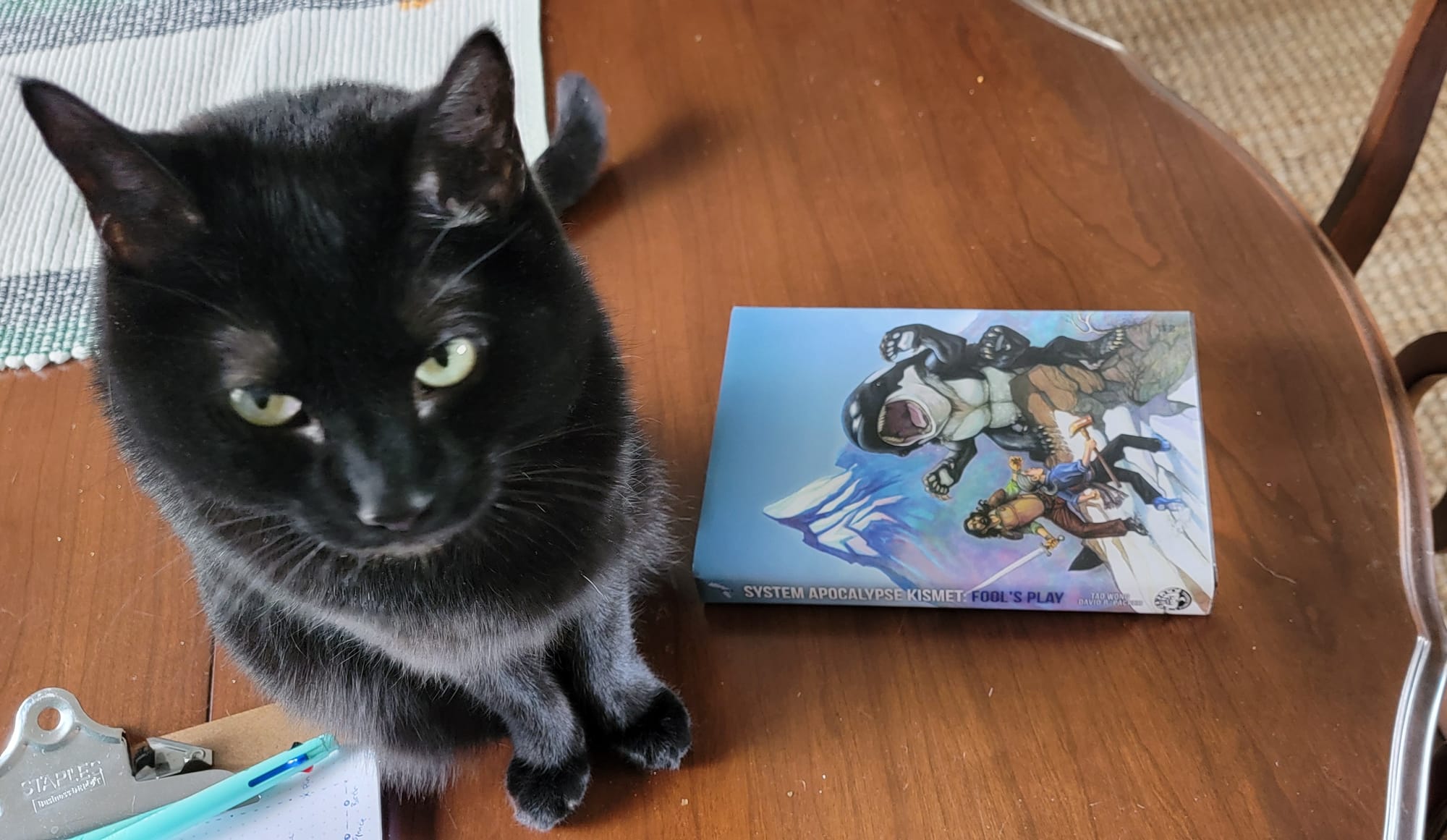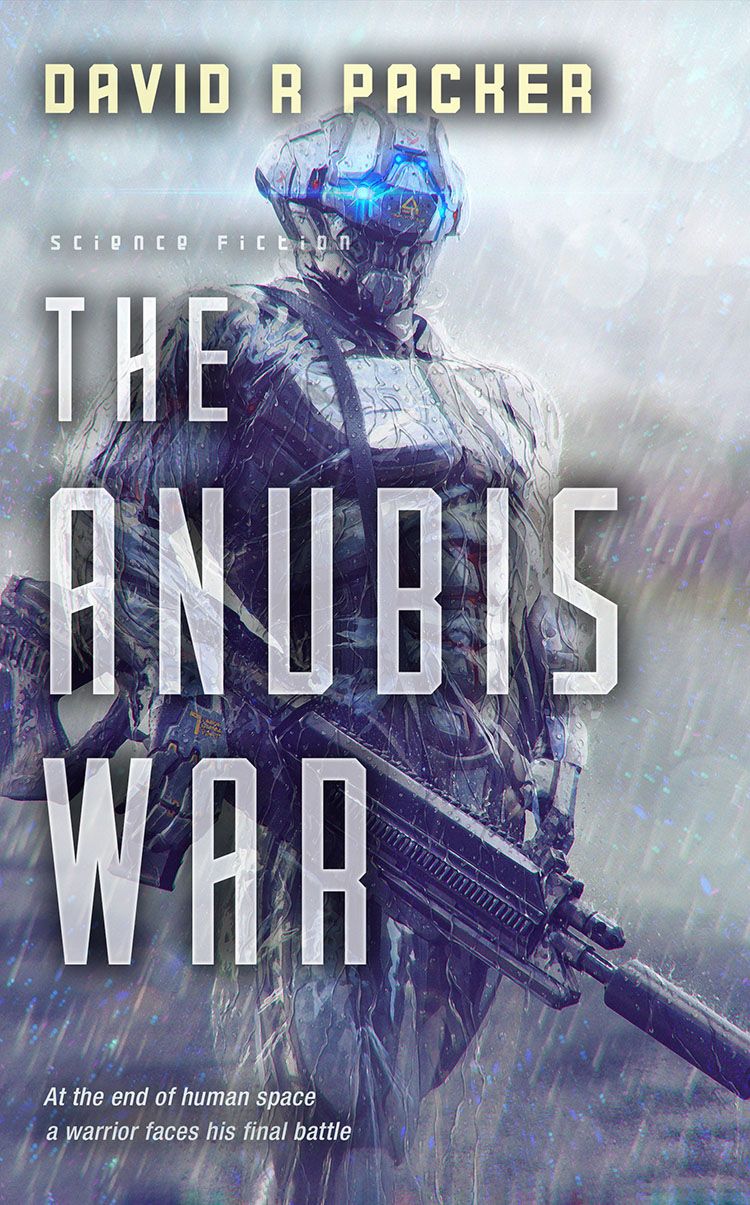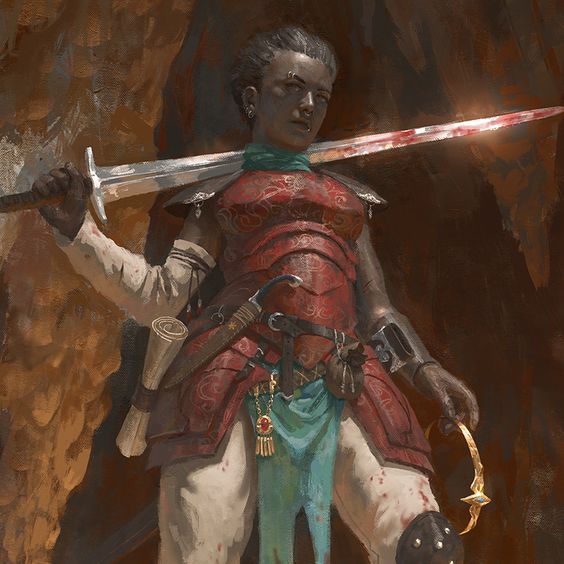Works

System Apocalypse: Kismet

I thought I'd take a nice photo of the special Kickstarter first edition of book one, but Mazekin got cross at the lack of cat representation here, so...here you go.
The System Apocalypse: Kismet trilogy is my current work, published by Starlit Publishing. The three books in the series are: Fool's Play, Fool's Bond, and Fool's Last Dance.
This series was fun. It was a step out of my chosen genres, and not something I ever expected I would do. Tao put out a call for short stories for an anthology in his System Apocalypse series, and I had an idea for that. I'd read his series before, and dabbled in some other LitRPG books, and Tao's work really struck me as having a fairly rich setting. I felt the setting was interesting enough that it would be fun to set a more standard fantasy tale in it. Inspiration struck, and I whipped out a 5000-ish word story in one long afternoon session. After some revisions, it was accepted. My idea had been to tell a Sword and Sorcery tale in a throwback style to Fritz Leiber's Fafhrd and the Gray Mouser stories. I was thrilled with how it turned out, and the feedback I got was good. The characters were fun to write, as a bonus.
And sometime after it had been published, Tao asked me if I'd like to do some other writing in his universe. I hadn't planned on that, since I had other work I was in the middle of writing, but...Fool and Jackal were absolutely alive in my head, and demanding that tell their story. So I proposed a trilogy, a story arc that would let the two of them grow and explore the world. I wanted to show a different side of the setting, less about people driven to be heroes and more about normal people who wind up doing heroic things, despite their flaws. Tao accepted my proposal, and I got down to writing.
This was the perfect opportunity for me. I'd just been laid off, and after some discussion with my wife, had taken a chance at being a full-time writer. Clearly a risky choice. The truth of being a novelist is that you can't have any chance of making a living at it unless you have a bunch of books written. Trad or self-published, the opportunities increase as your published volume increases. This trilogy was my chance to not just write some books that I was going to enjoy, but also an opportunity to force myself into professional mode. They gave me a goal, and I reached for it as hard as I could. I aimed to write the trilogy in 6 months. One book every 2 months.
The first two hit that pace, and then the third...well, life happened. But I learned that I can maintain a good writing pace as long as my mind is in the right spot. I also learned that I can do all the necessary plotting and planning without thinking about it much. I met my most important goal: Hitting and maintaining the level of output that made me feel like a pro.
Of course, that just opened up a whole new world of other things I needed to work on. Like editing and re-writing. And watching Tao and his team put in the incredible work to get my first draft into shape, turning into a product that readers would want and enjoy? WOW. If I'm going to self-publish and try to hit even half the standard they set? I have a lot of work ahead of me. But at least I know what I need to do.
The System Apocalypse: Kismet trilogy process felt like I was doing a master's degree in novel writing. It's been a process that has literally changed my life for the better, and I can't wait to see where I can go next.
The Anubis War

My first published novel.
You can blame my wife, Courtney, for this being written. I was working graveyard shifts doing security, and we missed each other. She insisted I write something for her to read every morning, so I started writing short stories and scenes. That resulted in one novel (that will never see the light of day) and when NaNoWriMo came along, I took the opportunity to see if I could write her a proper novel, something that I would enjoy writing, and that gave me a chance to explore some ideas in my head.
The genesis for this book was based on an idea I had back in the 90s, that I write a short story on, and submitted to a few magazines. Story was rejected, but the setting kept lingering in my head. I loved the idea of humans being spread out across a pocket of the Milky Way, and not having run into any aliens because they'd been wiped out in a war long before humans evolved. And then humans stumble into the winners of that war, who are a little bit shocked to see living creatures basically crawling out of a graveyard...
Fun, but a setting isn't a story. I struggled to find what was the conflict I wanted to explore and realized it was farther along. What happens when the humans fill up all the available space, and push into the settled lands of ancient alien civilizations? How do humans and aliens deal with that? To me, the interesting focal point of all of that would be at the edge, where the potential for conflict is the highest.
And that takes us to the Anubis system, one of the last human worlds not folded into the Human Polity. Vasco is an experienced soldier along on the mission to bring the system into the Polity, and what he experiences will shape the coming conflict between Humans and Aliens.
The sequel to this is called "Heorot" and was originally supposed to be out November of 2022, but is currently delayed due to some rather drastic life circumstances. It's currently about half way done.
The Salish Rift

My upcoming series, and the one I'm most looking forward to getting out in the world.
This one has a convoluted origin. It started out as a pilot for a TV series, with a focus on supervillains instead of superheros. When that project faded out, it left me with my scripts and the series bible, and some strong visions that wouldn't leave my head. I'd posited that superpowers in the series arose as a sort of psychic-evolution thing, sped along by some advances in nanotechnology. It was heavily influenced by Julian May's writings.
I played around with the characters, but something just wasn't gelling for me. I wondered about the connections between superheroes and mythology, and it came to me: What if a truly super-powered person wiped out the world, and re-shaped it? How would the world rebuild from that, and what would it look like, especially if the factors that caused those superpowers were still present? That was the birth of the Salish Rift.
The world was thoroughly destroyed, and all cultures lost. The event itself was a combination of massive geological shifts and a mass kill off of any sufficiently dense population group. The only survivors were those who were living remotely or away from other humans. For the Salish Rift, this means that the current population is descended from First Nations folks and scattered South-Asian sailors. They lost their cultures, and had to rebuild from what ideals they could. Which makes for some unique and interesting cultures in the Rift. Which brings us to the main story.
Set thousands of years after the cataclysm in the Salish Rift (what is currently the Salish Sea) two city-states are coming into renewed conflict. One city has been rebuilt on Roman/American ideals, and favours a libertarian-inspired fascism/industrial approach to rebuilding the world. They also practice eugenics, in an effort to stop the nannites from re-creating superpowers. The other city embraces the potential of human evolution via "magic" and embraces the former superheroes as gods. They have a long history of war with each other (Guns versus sorcery, yay!), but stalemated centuries ago.
Jaela Senecus is the hero of the story, being a daughter of a prosperous House of Purity in Bell's Faire. She's a bit of an outcast, as her chief desire in life is to learn swordplay from one of the Masters of Fence in the City of Pender, home of the mages.
The first novel is complete, and details Jaela's journey to Pender and the sites and conflicts she encounters on the ways. The second novel is a little over a third written, and details her experienced learning swordplay. The third novel is also about a third written, and covers how Jaela and her friends get involved in the growing conflict between the two cities.
